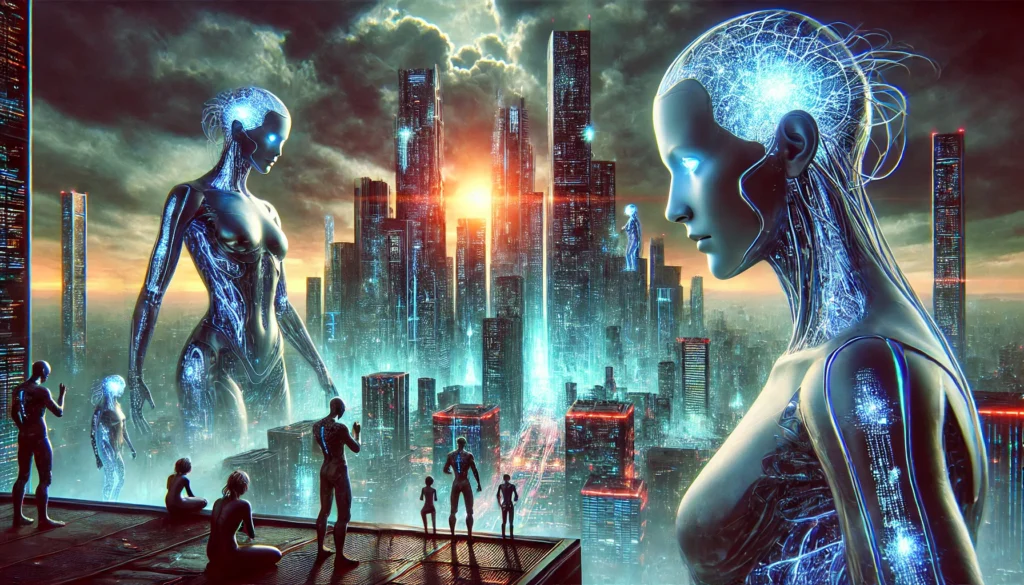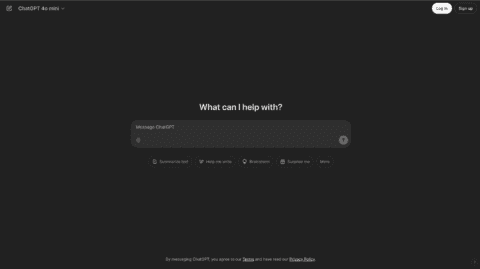Is AI Making Us Dumb?
Have you ever stopped to wonder if our growing reliance on artificial intelligence might be dulling our own mental faculties? Consider this: a recent study by researchers from Microsoft and Carnegie Mellon University found that individuals who regularly use generative AI tools at work tend to apply less critical thinking when evaluating the AI’s output. This raises an important question: as AI becomes more integrated into every aspect of our lives, are we inadvertently outsourcing our cognitive abilities to machines?
In this comprehensive post, we’ll dive deep into the provocative question, “Is AI making us dumb?” We’ll explore what this question really means, examine the historical context of our evolving relationship with technology, and discuss how AI is shaping our everyday decision-making processes. Along the way, we’ll review real-world examples, analyze case studies, and share actionable strategies for maintaining—and even enhancing—our critical thinking skills in an AI-dominated era.
Whether you’re a tech enthusiast, a professional relying on AI at work, or simply curious about the broader implications of our digital age, this post is for you. Let’s embark on a journey to understand the potential impacts of AI on our cognitive abilities and discover ways to harness technology without sacrificing our mental agility.
What Does “Is AI Making Us Dumb?” Really Mean?
At its core, the question “Is AI making us dumb?” reflects a growing concern that our increasing dependence on artificial intelligence might be eroding our ability to think critically, solve problems independently, and retain information. But what exactly does this mean?
Defining the Debate
- Artificial Intelligence (AI): A broad field of computer science focused on creating systems capable of performing tasks that normally require human intelligence. These tasks include problem-solving, understanding natural language, and even creative processes.
- Critical Thinking: The mental process of actively and skillfully analyzing, synthesizing, and evaluating information. It’s what we rely on to solve problems, make decisions, and innovate.
- Overreliance on AI: When individuals depend too heavily on AI systems for tasks like information retrieval, decision-making, or creative endeavors, potentially bypassing the rigorous mental exercise needed to develop and maintain their own cognitive skills.
The concern is that if we lean too much on AI—for instance, to generate ideas, draft emails, or even offer advice—we may gradually let our critical thinking and problem-solving skills atrophy. This phenomenon isn’t entirely new; history shows us that every major technological advancement brings both benefits and challenges to our cognitive development.
Historical Context: From Tools to Thought Partners
Our relationship with technology has always been a balancing act between convenience and cognitive engagement. Consider the following milestones:
- The Calculator Revolution: In the mid-20th century, calculators transformed the way we approached mathematics. While they made complex computations accessible, critics argued that they might diminish our ability to perform mental math.
- The Rise of the Internet: The advent of search engines like Google revolutionized access to information. However, concerns emerged that constant reliance on search engines might impede our ability to memorize or critically evaluate information.
- Modern AI Tools: Today, AI systems such as ChatGPT, Google Bard, and various recommendation engines do much more than answer simple questions—they can draft essays, generate creative content, and even simulate human-like conversations. The convenience of these tools is undeniable, but so too is the risk of substituting machine-generated output for our own cognitive labor.
Understanding this historical trajectory helps frame our current debate. Just as previous technological innovations forced society to reassess how we use our brains, the rise of generative AI calls for a renewed focus on how to maintain—and even enhance—our mental acuity.
A Brief History of AI: From Early Innovations to Modern Marvels
To appreciate the debate about AI’s impact on our cognitive abilities, it’s important to understand how AI has evolved over the years.
The Early Days of AI
- 1950s – The Dawn of AI: The term “artificial intelligence” was coined in the mid-20th century, when pioneers like Alan Turing and John McCarthy began exploring the possibility of machines that could mimic human thought processes. Turing’s seminal question, “Can machines think?” set the stage for decades of research.
- 1960s and 1970s – Rule-Based Systems: Early AI research focused on creating rule-based systems that could solve problems in specific domains, such as chess-playing programs and early expert systems. These systems were impressive for their time but limited in scope.
The AI Winter and Resurgence
- 1980s – AI Winter: After initial excitement, progress stalled due to limitations in computational power and overly optimistic expectations. Funding dwindled, and many early AI projects were shelved.
- 1990s to 2000s – A Resurgence: Advances in computer processing, data storage, and algorithmic design sparked a resurgence in AI research. Machine learning and neural networks began to show promise, leading to practical applications in fields like speech recognition and image processing.
The Modern Era: Generative AI and Beyond
- 2010s – The Rise of Big Data: With the explosion of digital data and improvements in computational resources, AI systems became more powerful and capable of handling complex tasks. The introduction of deep learning algorithms marked a turning point in AI development.
- 2020s – Generative AI Takes Center Stage: The advent of models like OpenAI’s GPT series, Google Bard, and other generative AI systems has revolutionized the way we interact with machines. These tools can generate human-like text, create art, and even simulate conversations, transforming industries from marketing to education.
Today, AI is ubiquitous in our lives—from virtual assistants on our smartphones to sophisticated data analysis tools in our workplaces. As these technologies become more integrated into our daily routines, the question arises: are we losing our ability to think independently?
How AI is Integrated into Our Daily Lives
Before we explore whether AI is making us dumb, it’s worth taking a closer look at just how pervasive AI has become. Let’s break down some of the most common areas where AI influences our lives:
Personal Assistants and Smart Devices
- Voice-Activated Assistants: Devices like Amazon Alexa, Google Assistant, and Apple’s Siri help manage our schedules, set reminders, and answer simple questions.
- Smart Home Technology: From thermostats that learn your schedule to refrigerators that track your groceries, AI is making our homes more efficient and responsive.
Information and Content Creation
- Search Engines: Algorithms prioritize information based on relevance and user behavior, shaping the way we access and consume content.
- Generative AI Tools: Platforms like ChatGPT can draft emails, write articles, and even create poetry. They offer a fast, convenient way to produce written content, but may also reduce the incentive to engage deeply with the writing process.
Decision-Making and Problem-Solving
- Navigation and Mapping: GPS systems powered by AI help us find the fastest route, but they can also erode our natural sense of direction.
- Financial Services: AI-driven tools help manage investments, detect fraud, and even offer personalized financial advice. While beneficial, these tools may cause us to rely on algorithmic decisions rather than our own financial acumen.
Workplace Applications
- Data Analysis: AI systems can sift through massive datasets to identify trends and insights that would take humans much longer to uncover.
- Customer Service: Chatbots and virtual agents handle routine inquiries, freeing up human employees for more complex tasks. However, constant use of these tools may lead to a decline in our ability to resolve problems independently.
The convenience of these technologies is undeniable, but as we’ll explore in the coming sections, the ease with which AI can handle everyday tasks may come at a cognitive cost.
The Impact of AI on Critical Thinking: What Does the Research Say?
Recent studies have begun to shine a light on the potential cognitive trade-offs associated with the heavy use of AI tools. Let’s examine some of the key findings from current research.
A Closer Look at the Microsoft-Carnegie Mellon Study
Researchers from Microsoft and Carnegie Mellon University conducted a study involving 319 participants who used generative AI at least once a week in their work routines. The study categorized AI usage into three main types:
- Creation: Using AI to draft emails or generate creative content.
- Information: Relying on AI for research, summarizing articles, or gathering data.
- Advice: Seeking AI-generated guidance or suggestions for decision-making.
The participants were then asked to evaluate whether using AI made them engage in more or less critical thinking. The findings revealed a concerning trend:
- Overreliance on AI: Many users reported that their dependence on AI led them to invest less effort in critical thinking. Instead of fully engaging in tasks that require creating, evaluating, and analyzing information, they often found themselves merely verifying whether the AI’s output was “good enough.”
- Confidence Gap: Interestingly, those who were more confident in AI’s capabilities tended to apply less critical thought to the task at hand compared to those who trusted their own judgment. This suggests that an overconfidence in AI may actually diminish our willingness to scrutinize and question its outputs.
These findings have significant implications. When workers rely too heavily on AI, they may not only fail to develop their own problem-solving skills but might also become less prepared to handle situations when AI falls short. In other words, if we allow AI to shoulder most of our cognitive workload, we risk atrophying the very faculties that make us capable of independent thought.
Beyond the Study: Broader Implications
The Microsoft-Carnegie Mellon study is just one piece of the puzzle. Broader research indicates that:
- Cognitive Offloading: Relying on AI can lead to a phenomenon known as cognitive offloading, where we delegate mental tasks to machines. While this can free up mental resources for other tasks, it may also result in a diminished capacity to perform those tasks independently.
- Reduced Problem-Solving Practice: When AI handles routine tasks, we may miss out on the daily “exercise” our brain needs to stay sharp. Just as physical muscles weaken without regular use, so too can our cognitive muscles deteriorate when we stop challenging them.
For more detailed insights into cognitive offloading and its effects on the brain, you might explore this resource on cognitive psychology.
Real-World Examples and Case Studies
To better understand how AI might be affecting our cognitive abilities, let’s delve into some real-world examples and case studies that illustrate these dynamics in action.
Case Study 1: AI in the Workplace
Scenario:
Emily works at a large corporation where she frequently uses an AI tool to draft reports, generate emails, and even assist with data analysis. Initially, the tool is a tremendous asset, streamlining her workflow and saving time. However, over several months, Emily notices that she is relying more on the AI and less on her own judgment.
Observations:
- Reduced Critical Engagement: Instead of thoroughly reviewing and editing the AI-generated content, Emily often accepts it with minimal modifications.
- Verification Fatigue: When the AI output is subpar, she finds herself scrambling to verify the information through other sources, a process that is both time-consuming and mentally taxing.
- Atrophied Problem-Solving: When unexpected problems arise—situations where the AI falls short—Emily feels less confident in her ability to devise creative solutions on her own.
Takeaway:
While AI can undoubtedly enhance productivity, overreliance may inadvertently lead to a reduction in the critical thinking skills that are essential for navigating complex, unforeseen challenges.
Case Study 2: AI in Education
Scenario:
In a university setting, students increasingly use AI-based tools to generate essay drafts, solve complex problems, and even answer exam questions. Professors have observed that while these tools can produce coherent content, many students fail to develop the underlying analytical skills required to construct well-formed arguments independently.
Observations:
- Shortcuts Over Learning: Instead of engaging deeply with the material, students opt for the path of least resistance by allowing AI to handle the heavy lifting.
- Diminished Writing Skills: Reliance on AI for drafting essays has led to a noticeable decline in students’ abilities to articulate their own thoughts and ideas.
- Dependency Culture: A growing number of students are less inclined to question or critique the AI’s output, resulting in a superficial understanding of the subject matter.
Takeaway:
The educational implications of overreliance on AI are significant. If students are not actively engaging in the learning process, they may miss out on developing critical analytical skills that are vital for academic and professional success.
Case Study 3: Navigation and Spatial Awareness
Scenario:
John, an avid traveler, relies heavily on GPS navigation for every journey, even for short trips in his hometown. Over time, John notices that he’s increasingly unable to navigate without digital assistance, often finding it difficult to recall routes or landmarks without the aid of technology.
Observations:
- Reduced Spatial Memory: John’s dependence on GPS has diminished his natural sense of direction and ability to recall geographical information.
- Overreliance on Technology: In situations where the GPS signal fails or provides incorrect directions, John feels disoriented and anxious, struggling to adapt to the unexpected challenge.
- Loss of Cognitive Mapping: The habit of always using GPS means that John no longer exercises the mental maps that are crucial for spatial awareness.
Takeaway:
John’s experience serves as a cautionary tale about the risks of relying too much on technology for tasks that were once natural exercises of our cognitive abilities. While GPS and navigation apps are incredibly useful, they can also lead to a weakening of our internal navigation skills.
Are We Becoming Overly Dependent on AI? The Cognitive Consequences
The examples above illustrate a common theme: the more we depend on AI for routine tasks, the less we engage in the cognitive practices that build and maintain our critical thinking skills. Let’s unpack some of the key consequences of this trend.
Cognitive Atrophy: The “Use It or Lose It” Principle
- Mental Muscles Need Exercise: Just as physical muscles atrophy without regular use, our cognitive abilities can weaken if we stop exercising them. When we allow AI to handle the bulk of our decision-making and problem-solving, we may inadvertently let our mental muscles go “rusty.”
- Reduced Practice in Problem-Solving: Regular engagement in critical thinking challenges our brain to adapt and grow. Without these routine exercises, our capacity for innovation and complex reasoning may diminish over time.
Shifting Cognitive Effort: Verification Over Creation
- Verification Fatigue: As seen in the workplace case study, users often find themselves spending more time verifying AI outputs than engaging in the creative or analytical processes that originally prompted the use of AI.
- Loss of Routine Judgment Opportunities: When we consistently rely on AI for answers, we miss out on the everyday opportunities to practice our judgment and decision-making skills—skills that are crucial when AI fails or produces unexpected results.
Social and Cultural Impacts
- Changing Communication Norms: In a world where AI can generate eloquent emails, social media posts, and even casual conversation, the art of personal expression may evolve—or even atrophy. This could have long-term effects on how we interact and form relationships.
- Educational Implications: If students grow accustomed to receiving AI-generated answers, the traditional educational model that emphasizes independent thinking and critical analysis may need to be reimagined to prevent a decline in academic rigor.
How to Keep Your Cognitive Muscles in Shape: Best Practices for AI Use
While the concerns are real, it’s important to note that AI is a tool—one that can be wielded responsibly. Here are some actionable tips and strategies to help you harness the benefits of AI without sacrificing your mental sharpness.
1. Practice Active Engagement
- Question the Output: Whenever you use AI to generate content or provide answers, make it a habit to critically evaluate its output. Ask yourself:
- Does this answer make sense?
- Are there alternative viewpoints or additional data to consider?
- Double-Check Information: Always verify AI-generated data using reputable sources. This habit not only improves accuracy but also reinforces your own analytical skills.
2. Balance AI Use with Independent Work
- Set Aside “No-AI” Time: Dedicate specific periods during your day where you solve problems, write, or create without AI assistance. This ensures that your cognitive processes remain active and engaged.
- Engage in Brain-Boosting Activities: Puzzles, brain games, and even reading challenging material can help keep your mind sharp. Consider incorporating activities like chess, Sudoku, or strategy-based video games into your routine.
3. Cultivate a Growth Mindset
- Embrace Lifelong Learning: Make a conscious effort to continuously challenge yourself with new tasks and projects that push your cognitive boundaries.
- Reflect on Your Thinking Process: Periodically assess how you approach problem-solving. Ask yourself if you’re relying too heavily on AI and what steps you can take to regain your analytical edge.
4. Use AI as a Collaborative Tool
- Enhance, Don’t Replace: Think of AI as a partner that can augment your capabilities rather than a crutch that replaces your thinking. Use it to brainstorm ideas or gather initial insights, but follow up with your own research and analysis.
- Collaborate and Discuss: Engage in discussions with colleagues or peers about the outputs generated by AI. This collaborative approach can spark new ideas and reinforce critical thinking through shared perspectives.
5. Stay Informed About AI’s Limitations
- Understand AI’s Boundaries: Familiarize yourself with the known limitations and biases inherent in AI systems. For instance, while AI can process vast amounts of data, it lacks the nuanced judgment that human experience provides.
- Keep Up With Research: Follow reputable sources and research publications to stay updated on how AI is evolving and the ongoing debates about its cognitive impacts. Resources like MIT Technology Review and Wired can offer valuable insights.
The Balance Between AI Assistance and Independent Thought
It’s clear that AI is not inherently making us “dumb”—it’s how we choose to use it that makes all the difference. The goal is not to shun AI entirely but to strike a balance between leveraging its benefits and preserving our own cognitive faculties.
The Case for Symbiosis
- AI as an Enabler: When used properly, AI can free up time for more complex, creative, and strategic tasks. This is especially true in environments where routine tasks consume significant mental energy.
- Maintaining Autonomy: It’s essential to remember that AI should serve as an extension of our own capabilities, not a replacement. By staying actively engaged in the process, we ensure that our decision-making remains informed and robust.
Strategies for a Healthy Partnership
- Critical Oversight: Always take the AI’s outputs with a grain of salt. Whether you’re drafting an email or making a financial decision, apply your judgment and cross-check the information.
- Regular Skill Assessment: Periodically assess your own skills and identify areas where you might be overly dependent on AI. Use this awareness to develop a personalized plan for cognitive improvement.
- Foster Creativity: Engage in creative pursuits that challenge you to think outside the box. Whether it’s writing, art, or problem-solving in new contexts, creativity is a powerful antidote to cognitive complacency.
Looking to the Future: Collaboration or Cognitive Decline?
As we move further into the age of artificial intelligence, one of the most pressing questions is how we can ensure that AI continues to serve as a tool for enhancement rather than a crutch that diminishes our intellectual capabilities.
The Promising Horizon
- Augmented Intelligence: The concept of augmented intelligence focuses on combining the strengths of human intuition with the analytical power of AI. This synergy has the potential to unlock unprecedented levels of creativity and problem-solving.
- Educational Innovations: Many educators and institutions are already exploring ways to integrate AI into curricula without compromising the development of critical thinking skills. Project-based learning, for instance, can encourage students to use AI as a resource while still requiring them to engage deeply with the material.
Potential Pitfalls
- Complacency: The risk of becoming too comfortable with AI is real. As AI tools become increasingly sophisticated, there’s a danger that we might rely on them to the point where our cognitive skills begin to fade.
- Skill Gaps: In professional settings, if employees become overly reliant on AI, there could be long-term consequences when they encounter problems that AI cannot solve. Maintaining a balance is crucial for fostering a workforce that is both efficient and capable of independent thought.
The Path Forward
- Policy and Practice: Organizations and educational institutions can develop policies that encourage balanced AI usage. This might include mandatory “tech-free” sessions or training programs focused on critical thinking and problem-solving.
- Cultural Shifts: On a societal level, there needs to be an ongoing conversation about the role of technology in our lives. By acknowledging both the benefits and the potential drawbacks of AI, we can work towards a future where technology enhances our cognitive abilities rather than diminishing them.
For a deeper dive into the future of AI and human collaboration, you might find this article on augmented intelligence an enlightening read.
Frequently Asked Questions (FAQ)
Q1: Does using AI at work mean I’ll lose my critical thinking skills?
A: Not necessarily. AI is a tool that, when used appropriately, can actually enhance your productivity and free up time for more complex tasks. The key is to ensure you continue to engage in activities that challenge your critical thinking. Regularly questioning AI outputs and engaging in independent problem-solving can help maintain your cognitive skills.
Q2: How can I balance using AI with developing my own skills?
A:
- Set specific periods where you work without AI assistance.
- Use AI as a starting point rather than a final answer.
- Engage in activities like reading, puzzles, or discussions that stimulate critical thinking.
- Continuously seek feedback on your work, both from peers and through self-reflection.
Q3: Are there any benefits to using AI that could enhance my cognitive abilities?
A: Absolutely. AI can serve as a powerful tool for augmenting your natural abilities. It can help you process large volumes of data quickly, generate creative ideas, and even suggest novel solutions to problems. The key is to use AI as a complement to your thinking, not as a substitute.
Q4: What are some signs that I might be overly reliant on AI?
A:
- You find it difficult to solve problems without consulting AI first.
- You rarely verify the information provided by AI with other sources.
- You notice a decline in your ability to perform tasks that require deep concentration or creative thought.
Q5: How can educators help students avoid overreliance on AI?
A:
- Incorporate AI into the curriculum as a tool rather than a crutch.
- Design assignments that require critical analysis and independent thought.
- Encourage discussions about the limitations of AI and the importance of human judgment.
Conclusion: Embracing AI Without Sacrificing Our Cognitive Powers
The question “Is AI making us dumb?” is far from a simple yes or no. Like many technological advances before it, AI presents both incredible opportunities and significant challenges. On one hand, AI can streamline our workflows, unlock creative potential, and provide valuable insights. On the other, an overreliance on these tools can lead to a dangerous atrophy of our critical thinking and problem-solving skills.
What’s the solution? It’s all about balance. By being aware of the potential pitfalls, engaging actively with the technology, and making a concerted effort to exercise our cognitive muscles, we can harness the benefits of AI while ensuring that our own intellectual abilities remain sharp and resilient.
Remember, technology is here to augment our capabilities—not to replace the unique human qualities that drive innovation, empathy, and deep understanding. Whether you’re using AI in your professional life, your education, or your daily routines, take the time to question, reflect, and challenge yourself. After all, our ability to think critically is what sets us apart.
Final Thoughts
The journey towards finding the right balance between AI assistance and independent thought is an ongoing process. As AI continues to evolve, so too must our approaches to learning and problem-solving. Let’s embrace AI as a powerful ally while continuously striving to strengthen our own cognitive skills. By doing so, we not only future-proof our minds but also ensure that technology remains a tool that serves us, rather than one that diminishes our inherent human capabilities.
We invite you to share your thoughts and experiences in the comments below. Have you noticed a shift in your own cognitive habits due to AI? What strategies have you found effective in maintaining your mental sharpness? Let’s keep the conversation going and work together to navigate this exciting yet challenging frontier.





